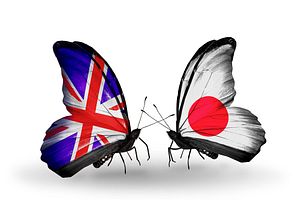Brexit was a bolt out of the blue, one with strategic, economic, and political implications not just for countries across the Atlantic, but also for ones in the Asia-Pacific, particularly Japan. On the strategic front, as Britain begins to determine how to move forward while exiting the European Union, if indeed it will, the nation’s interest in Asia-Pacific security will likely wane, at least temporarily, just as Japan was ramping up its relations with the country. Aside from France, which maintains a small naval fleet in the Pacific, the U.K. is the only other leader of EU and NATO that maintains Pacific interests, including through the Five Power Defense Arrangements it maintains with Australia, New Zealand, Malaysia, Singapore, and Brunei. In addition, London and Tokyo have deepened their ties with the launch last year of the annual “2+2” UK-Japan Foreign and Defense Ministerial meeting.
Meanwhile, in late August this year, JDS Kashima, flagship of the Japanese Maritime Self-Defense Force Training Squadron, is scheduled to lay anchor on the banks of River Thames, directly across the river from the London Eye Ferris wheel. The port call will allow Londoners a view of Japan’s Navy flag for the first time since 1902, the year in which Britain came out of its “glorious isolation” to forge the Anglo-Japanese Alliance. In late autumn, Royal Air Force Typhoon fighters, tankers, and convoy aircraft will reciprocate with a visit to Japan for the first-ever joint air drill with the Japanese Air Self-Defense Force.
As a result of Brexit, however, these military-to-military exchanges will be viewed as less consequential. Indeed, London’s broader moves at placing more emphasis on the Asia-Pacific will be hard to sustain as it concentrates its diplomatic capital on Europe, at least for some time to come.
Multiple motivations have led Tokyo to enhance its relationship with London. The sea counts more for Japan’s national security than the land. British Commonwealth nations in the Indo-Pacific, with their commitment to democracy and a rules-based international order, are the countries with which Japan shares values and interests and so seeks closer ties. Given the U.K.’s special relationship with the United States, Tokyo also expected closer links to the U.K. to further U.S.-Japan ties. Moreover, with more than 1,300 Japanese companies having set up shop in the U.K., making Japan the second largest source of foreign direct investment in the country after the United States, the Japan-U.K. economic relationship has burgeoned. Those robust economic ties prompted Prime Minister Shinzo Abe, on a visit to the U.K. last month, to warn that on Brexit, “A vote to leave would make the U.K. a less attractive destination for Japanese investment.” Yet, even the city of Sunderland, where Nissan has built the largest U.K. car manufacturing plant ever—employing 6,700 workers who, in turn, support another 35,000 local jobs—voted by a large margin to leave.
Brexit shows how unexpected events can have enormous economic consequences—and the need for preparation to deal with them. As Abe cautioned other leaders last month at the Ise-Shima G7 Summit meeting, “In 2008 when we gathered up north in Hokkaido, none of us was prepared for the financial calamity that had been in the offing. This time, we must do a better job by using our fiscal space.” Unfortunately, British Prime Minister David Cameron barely acknowledged the advice.
As a result of Brexit, the British pound has depreciated to 30-year lows while the yen has strengthened significantly at the same time that Japan’s share prices have declined. These twin developments have created additional headwinds for Abenomics, the prime minister’s strategy to combat deflation, eradicate secular stagnation hindering increased consumption, and return Japan to sustained growth.
The Brexit vote shows that even the oldest parliamentary democracy can be paralyzed—and much more easily than London-based intellectuals ever contemplated. Indeed, the city, with its politicians, think tankers, and bankers, appears to be an isolated island of “Stayers” in a country of “Leavers” who hold deep suspicions of London and the elites who populate it.
Social media may have strengthened grass-roots awareness of the vote on Brexit, but short messages and tweets, which are often viral and self-reinforcing, added little to the sort of considered discourse that an issue of Brexit’s import required. Clearly, representative democracy requires reasoned and informed debate on matters having global effects. Abe no doubt noticed how a referendum on key issues like Brexit can inflame demagogy, unleash xenophobia, and possibly disunite an entire nation. Amending the Japanese constitution, the prime minister’s life-long mission, will require not only a vote in both houses of the Diet, but also a popular referendum, which might now appear forbiddingly difficult in an age of digitized democracy where passion, not reason, predominates.
Brexit has also taught the Japanese of the potential dangers of a generational divide. In the U.K., those with a life expectancy of less than 20 years voted overwhelmingly to leave the EU, while those likely to live another 50 years voted to stay. This raises parallels to Japan, where generational fault lines on such key issues as women in the workforce and regulatory reform, which will have a greater impact on the young, may run even deeper. In an ever more interconnected world, which the young understand and embrace for the enormous opportunities it affords, perhaps we should heed their views on issues of long-term consequence more than those who reject the new and unfamiliar in a vain hope to return to a previous age when they themselves were young. At minimum, we must do a better job convincing the young to vote in larger numbers so that their voices will not be drowned out by older voters who turn out in disproportionately high numbers.
Tomohiko Taniguchi joined Sasakawa USA as a Distinguished Non-Resident Fellow in December 2015. He is a professor at the Keio University Graduate School of System Design and Management (SDM), teaching international political economy and Japanese diplomacy. He also serves as Special Adviser to Prime Minister Shinzo Abe’s Cabinet.

































